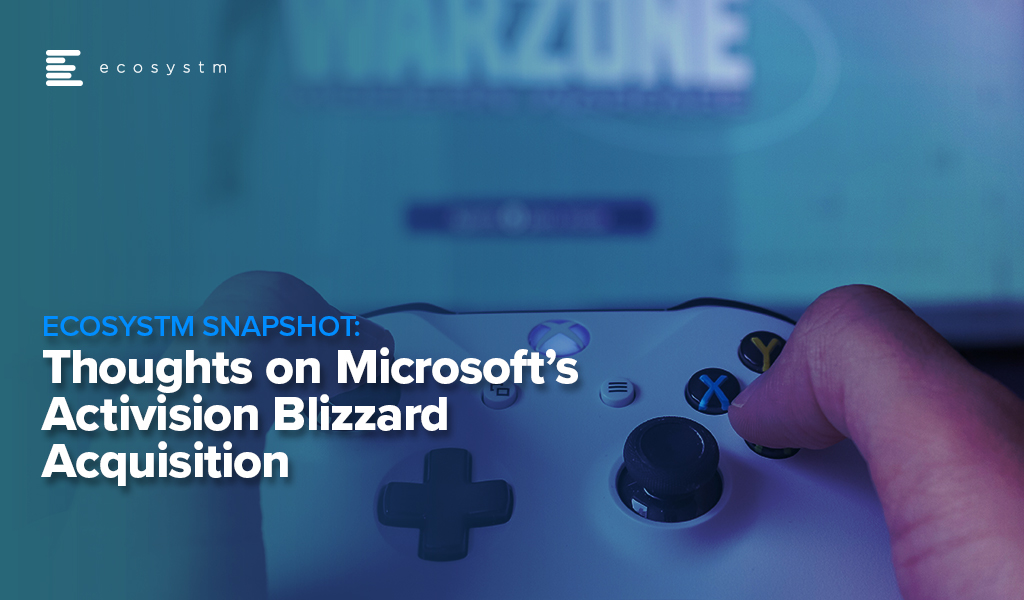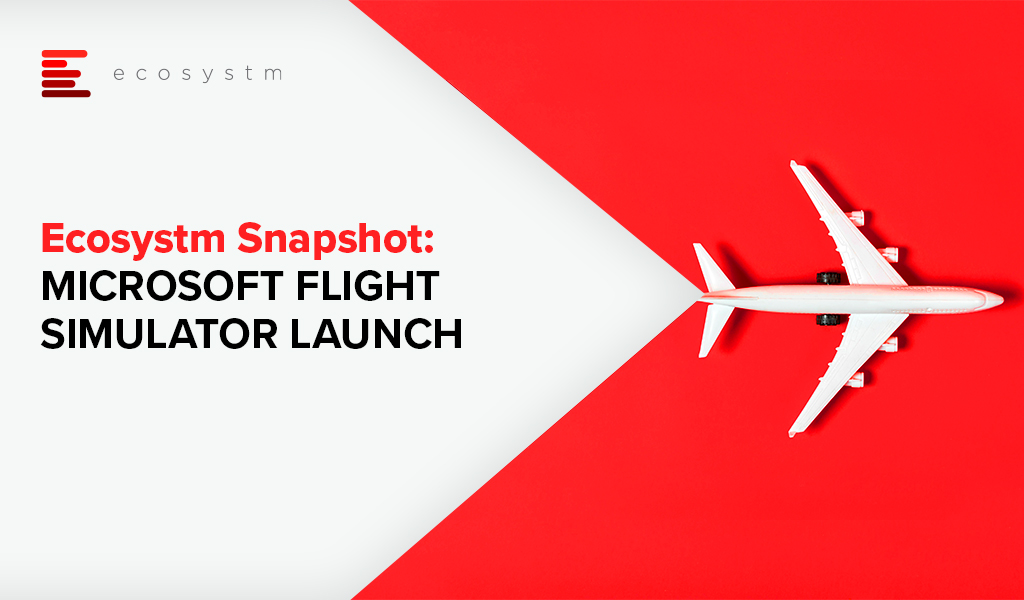Microsoft announced their intentions to acquire Activision Blizzard for USD 68.7 billion, creating quite a buzz in the Gaming and tech industry. The acquisition is set to be completed in 2023 and according to Microsoft is well set to fuel “growth in Microsoft’s gaming business across mobile, PC, console and cloud and will provide building blocks for the metaverse.”
There have been a few animated discussions at Ecosystm on Microsoft’s potential monopoly in the Gaming industry, whether it is aligned to their ‘Metaverse plans’ and the challenges that Microsoft is likely to face with the acquisition. Here is what our experts have to say.
Impact on the Gaming Industry

Activision Blizzard is the publisher of some of the most popular games around – loved by both hardcore and casual gamers. The acquisition of franchises such as Call of Duty, Overwatch, Warcraft and Diablo – as well as mobile games like Candy Crush and Hearthstone – demonstrates Microsoft’s commitment to what is now the largest medium of entertainment.
Microsoft is clearly focusing on growing their software revenue. But most importantly, they will be able to integrate these popular titles within Game Pass. This allows them to compete more actively with Steam and Epic Games Store but as a subscription-based model. The Game Pass model has proven extremely popular with gamers (with approximately 25 million gamers spending USD 10 per month to subscribe to the service), so this will continue to bolster their market position and increase users and revenue.
The latest Xbox Series X/S are the fastest-selling Xboxes ever – even with chip shortages and logistics challenges. The majority of Microsoft’s gaming revenue comes from hardware now. This acquisition will inevitably drive hardware growth, as well as increase gaming software revenue from both a subscription on Game Pass as well as outright purchases.
Microsoft’s Bigger Play

Microsoft made a great start by acquiring key titles like Doom in 2020. The go-to-market strategy through subscriptions and gaming as a cloud service is well managed. Last year when Microsoft relaunched Flight Simulator, the Ecosystm review spoke of how Microsoft wanted to be the “Netflix of Gaming”. They just fired another big shot in that battle by announcing their intention to acquire Activision. With a USD 69 billion price tag, it is probably more of a ballistic missile than a shot!
There has been a lot of conversation (including at Ecosystm!) on how this acquisition makes sense. Microsoft’s revenue from gaming sales is said to be USD 11.5 billion on an annualised basis – and Activision’s revenue is estimated to be USD 7.7 billion. The combination will obviously be huge, but is it worth so much? It is!
The reason for that is today’s leading buzzword – the Metaverse. As people live more of their lives in an online world and interact more with their peers online, being a leader in that “universe” is the key to the future. The Metaverse occupies the spaces of work, play and socialisation which have all gone increasingly virtual.
For Microsoft, this really translates into how relevant their cloud is to the Metaverse. This is a world where one can play using Game Pass, work on Office 365 and store everything on OneDrive. This pervasiveness is key to Microsoft’s consumer strategy. On the enterprise side, they have a dominant share, especially with Office 365. This will see them gaining strength in the consumer business.
Challenges for Microsoft

What a bargain for Microsoft! When Microsoft made the USD 95 per share offer this week Activision’s market value was about USD 51 billion. While the premium that they are offering was almost 50% of the share market close on the previous trading day, they are getting market-leading content for about 10% less than what Activision was worth in February 2021. A year in which the pandemic continued to increase demand for online gaming.
However, this leaves Microsoft with three significant challenges.
First, they have to get regulatory approval in the different markets in which the two companies operate. Microsoft has advised they expect the deal to close in late 2023, so it looks like they are expecting some interesting discussions over the next few months. This acquisition is a significant consolidation of the Gaming market, so regulators will look at the deal closely.
In addition, regulators will also look closely at the privacy implications, with Microsoft gaining access to millions of gamers’ personal details to add to the personal information they already hold from their other divisions.
Second, they have the challenge of addressing the sexual harassment issues that caused the drop in Activision’s market value. There are court settlements under appeal, and reports talk about 40 people leaving Activision since July. Integrating the large teams into Microsoft will need careful attention.
Third, retaining the talent in Activision may be a challenge for Microsoft as I would expect their competition to be actively approaching Activision’s key creatives.
Unless these challenges are handled well, the company they bid on may not be the company they acquire.
Last year Microsoft announced it was developing a new version of Flight Simulator which caught many of us by surprise. Flight Simulator? Really? The last launch of a new version of the game was in 2006 – 14 years ago, now!! How does something come back after all these years?
Now that it has launched about a week ago, the initial feedback has been extremely positive and it appears that Microsoft has a winner here. An analysis even claims that it will spur $2.6 billion in hardware sales of PCs, game accessories and the like!
I wanted to unpeel the onion a bit to take a closer look at what is going on and discovered a world of interesting developments around this product.
My first thoughts on hearing the announcement was that Microsoft, who has been steadily losing the battle of consoles to Sony’s PlayStation platform, was reviving this old favourite to resuscitate its drooping share.
Not a bad move. Flight Simulator has a core of die-hard fans – it even boasts of professional pilots who play the game as relaxation. It has a long history and a captive fan community. But it is old. That loyal community is not part of the demographic that a gaming company would normally look at today.
The other interesting aspect to consider is the COVID-19 situation this year. Obviously, Microsoft did not know this at the time they embarked on this project but the pandemic has turned everything on its head – hardware sales are through the roof – including accessories, at a time when people have been homebound and looking for entertainment within the four walls of one’s abode. The Ecosystm Digital Priorities in the New Normal study finds that 76% of organisations increased their hardware investments when the crisis hit – and 67% of organisations expect their hardware spending to go up in 2020-21. And that is only on the enterprise side of things. On the consumer side, at this point joysticks are in short supply – a trend that seems to have been accelerated by the Microsoft launch last week, interestingly – and so are PCs. The PC vendors are all enjoying a bumper year of growth. This is an ideal time to launch a really cool new version of the game.
Microsoft’s Bigger Game
The reality however is that while Flight Simulator will add to the revenue and also give Xbox One a fillip, Microsoft is probably after a much bigger “game” (excuse the pun!). The company has called its ‘Xbox Game Pass’ the Netflix of the gaming market. With multiple cloud-based gaming platforms having been launched – many with subscription services – the battle is on to decide the winners in a relatively new space. To this end, Microsoft has announced an intention to make Game Pass available across different devices – XBox console, PCs, tablets, phones. Having a title like Flight Simulator available through Game Pass, will act as a key hook to get customers to sign up for the subscription.
The new Flight Simulator version has been developed using AI and real-world imagery brought in with data from Bing Maps. With the newly added realistic scenery, it also seems like a great fit for use with the HoloLens Virtual Reality headsets. In one shot Microsoft is showcasing their lead in areas of technology which are likely to prove attractive to developers in a big way. I believe that this is a way for them to entice more developers on to Azure and to Microsoft cloud to develop their games – “AI SDKs anyone? Virtual Reality tools anyone?”
What seems at first glance like the launch of a new “future is here” version of a great game will turn out to be a possible big swing at multiple targets by Microsoft – at leadership in gaming with Game Pass; at reviving Xbox fortunes; at leadership in game development platforms, with Azure packing AI services, Bing Maps, AR/VR tools, among other technologies to move more development on to the Microsoft cloud. In the process Microsoft launched a highly enjoyable game and got closer to their ultimate aim to indeed become the Netflix of gaming.
Great move Microsoft! Tip: This could also give them a foothold in the virtual travel and virtual vacations market! That would be a hot seller in these times.



